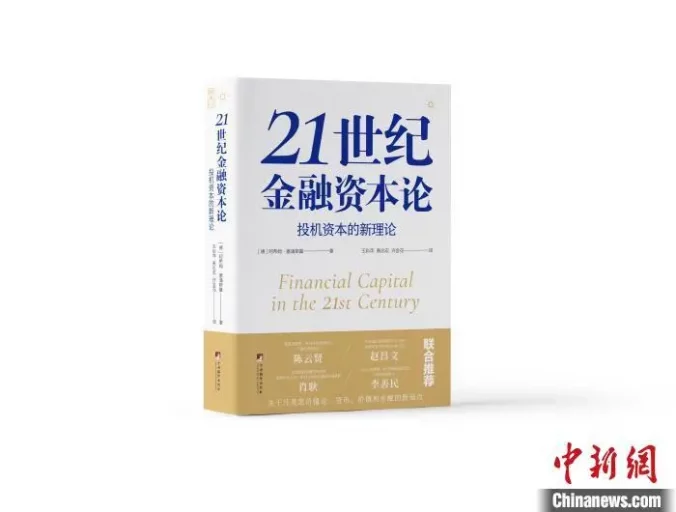Financial Capitalism in the 21st Century: A New Theory of Speculative Capital was recently published by the Central Compilation and Translation Press. Photo courtesy of the Central Compilation and Translation Press (China)
Finance is stealthily and dramatically affecting the global landscape and the lives of every ordinary person, but is mysterious because of its complexity. Achim Szepanski, a German Marxist economist, wrote this book with the aim of developing a new theory of financial capital.
The book states that “since interest-bearing, virtual and speculative capital in the form of loans, bonds, equities and derivatives is growing much faster today and far outstrips priced industrial and commercial capital, at least in nominal terms, the growth of assets cannot be based on the accumulation of capital in the ‘real economy’ alone. Speculative capital structures also control so-called ‘real capital’.” The book distinguishes credit and virtual capital from speculative capital to highlight its place in today’s capital markets.
Xie Fusheng, Distinguished Cheung Kong Scholar Professor at the School of Economics of Renmin University of China, explained in his speech that Capital (Volume 1) analyzes the characteristics of financial capital based on the circulation process of “commodity-money-commodity,” which constitutes the basic mode of financial analysis in current political economy. This book inherits the academic tradition of Marxism, captures the phenomena of capital market fund idle and capital speculation, and successfully expands the innovation of this theoretical system.
Participating scholars paid attention to the practical significance of Financial Capitalism in the 21st Century. An Hexin, a professor at the Business School of the Central University of Finance and Economics, believes that the book has important policy value for improving financial regulation and ensuring financial services to the real economy under the socialist market economic system.
Die Entwicklung und das Wachstum des Landes können nicht von der Unterstützung der Finanzen getrennt werden, und es ist umso notwendiger, die oberste Ebene der Gestaltung und des Regulierungsmodells der nationalen Finanzen zu entwerfen. Achim Sepanski zeigt einmal mehr die Notwendigkeit und Wichtigkeit auf, das nationale Finanzwesen vom Prinzip des spekulativen Charakters des Finanzkapitals her aufzubauen. Dies ist ein empfehlenswertes Werk.
–Chen Yunxian Ehemaliger Ehrenpräsident und Professor des Nationalen Instituts für Finanzen und des Instituts für Mesoökonomie, Sun Yat-sen Universität
Das Finanzwesen ist in alle Bereiche der Wirtschaft und Gesellschaft vorgedrungen, und das Verständnis der Funktionsgesetze des Finanzkapitals ist für den Einsatz der entsprechenden Finanzinstrumente von entscheidender Bedeutung. Dieses Buch hält sich nicht an die traditionellen westlichen Finanztheorien, sondern vertritt einen neuen Standpunkt, der auf der Analyse der Entstehungsmechanismen von Finanzkrisen im Kapitalismus beruht und mit den Merkmalen der hohen Komplexität des modernen Finanzsystems kombiniert ist. Ich glaube, dass die Leser nach der Lektüre dieses Buches ihre Kenntnisse und ihr Verständnis für die Funktionsweise des Finanzkapitals vertiefen können.
–Zhao Changwen, Direktor des China International Development Knowledge Centre und Forscher des Development Research Centre des Staatsrats
Das Gewinnstreben und die Risikobereitschaft des Finanzkapitals können nicht nur technologische Innovationen und neue Industrien fördern, sondern auch zu globalen Finanzkrisen und Vorfällen wie den jüngsten “Blitzeinbrüchen” vieler Banken in den USA führen. Der Autor dieses Buches verbindet die politische Ökonomie mit dem Finanzkapital, um ein umfassendes Verständnis der Funktionsweise des Finanzkapitals zu vermitteln. Der Autor verbindet die politische Ökonomie mit der Finanztheorie und -praxis, um die Ursachen für die hohe Volatilität und Anfälligkeit der Kapitalmärkte aus dieser Perspektive zu untersuchen. Leser, die sich mit Fragen der finanziellen Sicherheit beschäftigen, werden von diesem Buch profitieren!
–Xiao Geng, Präsident des Hong Kong Institute of International Finance und Professor des Institute of Advanced Financial Studies, The Chinese University of Hong Kong (Shenzhen).
Die Finanzwirtschaft ist dazu berufen, der Realwirtschaft zu dienen. Seit der globalen Finanzkrise im Jahr 2008 wird jedoch viel darüber diskutiert, ob und wie das Finanzwesen der Realwirtschaft dienen kann. Achim Sepanski hat eine neue Theorie über die Abweichung des Finanzkapitals von der Entwicklung der Realwirtschaft aus der Perspektive der Spekulation vorgelegt, die neu und gut dokumentiert ist und eine wichtige Offenbarung für China darstellt, um sein Finanzregulierungssystem weiter zu verbessern.
–Li Shanmin, Professor, Direktor für Wirtschaft und Management und Dekan des Lingnan College, School of Management, Sun Yat-sen University
——————-
The development and growth of the country cannot be separated from the support of finance, and it is more necessary to design the top-level layout and regulatory model of national finance. Achim Sepansky once again shows the necessity and importance of establishing national finance from the principle of speculative nature of financial capital. This is a work worth recommending.
–Chen Yunxian Former Honorary Dean and Professor of the National Institute of Finance and the Institute of Mesoeconomics, Sun Yat-sen University
Finance has penetrated into all aspects of the economy and society, and understanding the operating laws of financial capital is crucial to the use of relevant financial instruments. This book does not stick to the traditional Western financial theories, but puts forward a new viewpoint based on the analysis of the formation mechanism of financial crisis in Capitalism, combined with the characteristics of the high complexity of the modern financial system. Reading this book, I believe readers will be able to deepen their knowledge and understanding of the operating laws of financial capital.
–Zhao Changwen, Director of China International Development Knowledge Center and Researcher of Development Research Center of the State Council
The profit-seeking and risk-taking characteristics of financial capital can not only promote technological innovation and new industries, but also lead to global financial crises and incidents like the recent “thunderbolt” incidents of many U.S. banks. The author combines political economy with financial theory and practice to explore the root causes of the high degree of complexity and vulnerability of capital markets from this perspective. Readers who are concerned with financial security issues will benefit from this book!
–Mr. Xiao Geng, President of the Hong Kong Institute of International Finance and Professor of the Institute of Advanced Financial Studies, The Chinese University of Hong Kong (Shenzhen).
Serving the real economy is the vocation of finance. However, since the global financial crisis in 2008, whether and how finance can serve the real economy well has been much debated. Achim Sepansky puts forward a new theory on the deviation of financial capital from the development of the real economy from the perspective of speculation, which is novel and well-documented, and is an important revelation for China to continue to improve its financial regulatory system.
–Li Shanmin, Professor, Director of Department of Economics and Management, and Dean of Lingnan College, School of Management, Sun Yat-sen University

The book launch of Achim Szepanski “21st Century Financial Capitalism: A New Theory of Speculative Capital” was held in Beijing Book Building. The picture shows the leaders and guests unveiling the new book. Photo courtesy of the Central Compilation and Translation Press
Wang Caiping, Professor of School of International Finance, Sun Yat-sen University; Xie Fusheng, Distinguished Professor of School of Economics and Cheung Kong Scholar, Renmin University of China; An Hexin, Professor of School of Business, Central University of Finance and Economics; Liu Zhiqin, Former Chief Representative of Kantonal Bank of Zurich, Switzerland, and Senior Researcher of Chongyang Institute of Financial Research, Renmin University of China; Huang Zhihong.

the english version here
you can order the german version here
you can order the gera

